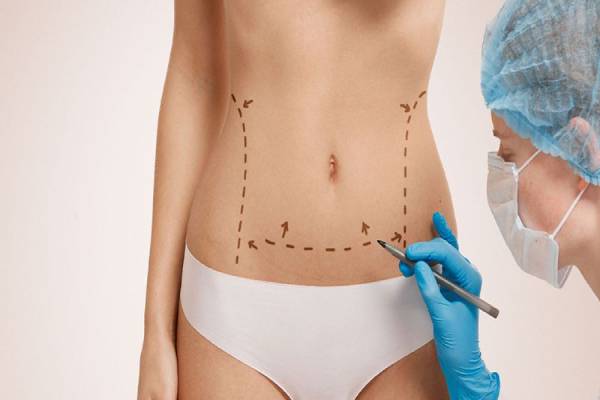Table of Contents
Abdominoplasty surgery, which is performed to remove excess skin and fat from the abdomen as well as tighten the underlying muscles, has become very popular in the world and is now one of the five most popular cosmetic surgeries.
Abdominoplasty is performed for purely aesthetic reasons: these days, many people dream of having a flatter and more beautiful abdomen. Some people may choose this surgery because of an enlarged abdomen or sagging skin.
This surgery can improve the quality of life and make the patient feel more satisfied with their physical appearance, but it will not affect their physical health. Abdominoplasty will not replace diet, exercise, and physical activity and will not cause much weight loss. Some other methods that your doctor may suggest include liposuction, panniculectomy, and bariatric surgery, some of which may be appropriate instead of abdominoplasty.
Because many patients undergo a scalpel to heal their midsection, it is important to know how to care for the incision.
Abdominoplasty can be performed in two ways:
Complete Abdominoplasty Surgery: This surgery typically involves a large incision in the abdomen to remove excess fat and sagging skin, possibly creating a new abdomen umbilicus.
Partial or small abdominoplasty: This is called a mini-abdominoplasty surgery, which requires a smaller incision by removing less tissue in the abdomen that may not have an incision around the navel of the abdomen.
Recovery varies from person to person!
If you are planning and intending to have abdominoplasty surgery, you should be aware that postoperative recovery is not the same for everyone. Your recovery depends on some factors, including your age, health, and body weight. Also, the type of abdominoplasty surgery you do has an impact on the healing process.
It is normal to want the incisions and stitches to go away very quickly after surgery and return to normal, but it is important to give your body time to heal. Sometimes you may need to stay in the hospital for a few hours after the operation, and your surgeon may recommend that you stay overnight or more.
As soon as you are discharged from the hospital, the real healing process begins, but only if you pay attention to the following:
Schedule for Recovery
You need to set a time frame for your recovery period. In this case, you will have a lot of time for recovery and you can let go of certain aspects of life for a while.
Make sure you include everything in this framework and you will be fully prepared for your recovery period.
After the operation, the drain will remain in your abdomen for a few days. You will be shown how to take care of this drain and empty it. You will also need to take an antibiotic and anticoagulant.
You will wear an abdominal binder for about six weeks. This binder prevents fluid from accumulating at the site and is recommended for the care of your abdominal surgery site.
The recovery period is usually shorter for mini-abdominoplasty surgery, but you should still refrain from strenuous activity for at least six weeks. This includes any strenuous exercise or lifting heavy objects.

What do you expect after surgery?
Your surgeon or nurse will give you information on how to heal at home.
Get the information you need about the following:
Learn how to care for cuts and empty drains;
Get information about infection or general health;
For six weeks, avoid physical activity and work that affects your incision line and sutures;
Ask when you need to be seen again by the plastic surgeon;
Ask how long you should use the abdominal binder;
Ask how much you need to rest;
Find out what meals you should eat during this time.
You must have someone with you to accompany you, from the hospital to your home, and to take care of you, at least in the first days after the operation. You can take a bath 48 hours after removing the drain. You may want to use a sponge to cleanse your body instead of taking a full shower. It may be best to use a chair for a while for extra safety when bathing.
Your doctor will prescribe an antibiotic and possibly an anticoagulant. You may be recommended cream for use on the skin. Take any pain reliever as directed by your doctor. You should not take any medicine containing aspirin unless prescribed by your doctor.
You should also avoid alcohol if you are taking painkillers. Avoid any nicotine-containing substances for at least six weeks, as smoking can delay your recovery and have side effects./Abdominoplasty surgery in Iran
Home Remedies
You may need to rest completely for the first few days after surgery. Gradually raising the upper limbs along with bending the knees at a certain angle can help reduce swelling. Your doctor will advise you to reduce the pressure on your abdomen by placing a pillow under your knee. Be active after surgery. You can even take a short walk. This activity helps your blood flow to speed up the healing process and reduces the chance of blood clots in your legs.
Your surgeon will advise you to rest as much as possible, as you may feel tired for weeks or even months.
You will need a few weeks to fully return to normal. You can not drive for several weeks, and for a period of about four to six weeks, you should avoid strenuous exercises and physical activity. Talk to your doctor about activities you can do and when to return to work.
Possible Side Effects
The most significant complication will be severe pain in the first few days after surgery. You can use painkillers to control the pain you may be experiencing.
Postoperative swelling may last up to three months.
When you want to stand straight, you may feel your abdomen stretch.
You may feel numbness in your abdomen for months or even years.
It is normal to see bruising in the abdomen.
There may be fluid-containing swelling above the wound that will go away over time.
The scar may be red and enlarged, which eventually disappears over time.
Tips for Recovery
Taking steps to achieve complete recovery is very important. You want to be as healthy as possible during this time.
Prepare a comfortable space to relax and provide everything you need. Have complete rest for at least two weeks and do not put yourself under any pressure. Before surgery, try to do all the backlog.
You need to drink plenty of water to get rid of toxins from your body’s metabolism and reduce swelling.
Keep your diet as healthy as possible. Eat as many fresh fruits and vegetables as possible.
The following are recommended for abdominoplasty surgery:
Take supplements containing vitamin A and vitamin C.
Drink green tea to boost immunity and antioxidant levels.
Take a probiotic supplement.
Eat pineapple to reduce bloating and inflammation.
Use Arnica to reduce swelling, bruising, and pain.
Use special creams and solutions to heal your stitches and incisions.
Use phosphorus supplements or drink ginger tea to relieve nausea.
Concluding Remarks
Abdominoplasty is a cosmetic surgery performed for those who want a smoother and firmer abdomen. When deciding to have this surgery, you need to consider many things, including whether the treatment is right for you, how long it takes for recovery, and how the wounds will heal. Talk openly with your doctor about the pros and cons of this surgery.
There are many things to consider when recovering from abdominal abdominoplasty surgery, all of which can be achieved and controlled. You just need to consider and plan all aspects of the recovery, including the time frame.
Recovery is a slow process. Therefore, walk towards the goal of complete recovery every day, and if you have any questions or concerns, be sure to contact your surgeon or doctor.




